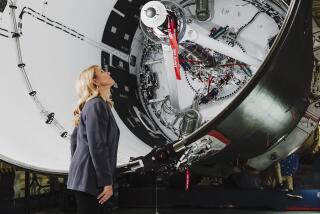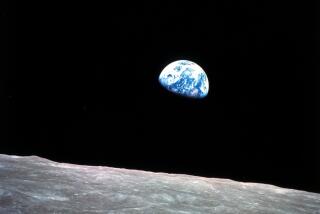Robert Anderson, 85; made Rockwell an aerospace titan
- Share via
Robert Anderson, a colorful automotive engineer who turned Rockwell International Corp. into an aerospace powerhouse that in its heyday built the space shuttle and the B-1B bomber in sprawling Southern California factories, has died. He was 85.
Anderson died Saturday at his home in Los Angeles from complications of cancer, said Pamela Tvrdy, a spokeswoman for Rockwell Collins, one of several companies that were spun off from Rockwell International.
For the record:
12:00 a.m. Nov. 5, 2006 For The Record
Los Angeles Times Sunday November 05, 2006 Home Edition Main News Part A Page 2 National Desk 0 inches; 27 words Type of Material: Correction
Anderson obituary: The obituary of former Rockwell International Chairman Robert Anderson in Friday’s California section misspelled the last name of his successor, Donald R. Beall, as Beal.
A chain smoker with a gravelly voice, Anderson oversaw the development of NASA’s space shuttle and the Air Force’s B-1B aircraft as president and chairman of Rockwell International, once one of the world’s largest aerospace companies.
“Bob was widely recognized for his strong leadership in the aerospace and defense and automotive industries,” Clay Jones, Rockwell Collins’ chairman, said in a statement.
Though better known as one of the more blunt executives in the usually staid aerospace industry -- he once said “A bomber is a baby-killer. People don’t like bombers” -- Anderson also had a distinguished, 22-year career in the automotive business.
Anderson helped develop the Plymouth “426 hemi” engine that NASCAR’s Richard Petty drove to win his first Daytona 500 race in 1964.
Anderson later became general manager of the Chrysler-Plymouth division where he was instrumental in creating and marketing the Plymouth Road Runner, a popular “muscle” car.
But Anderson’s biggest accomplishments came as top executive of Rockwell International, where he was credited with restoring the company’s financial health after a series of botched forays into consumer products in the early 1970s. At one point, the company was losing $1 million a day.
Soon after becoming chief executive in 1974, Anderson shed much of the consumer business, including Admiral television and appliances, and refocused the company on aerospace and defense-related products.
He was a tenacious salesman for the B-1B bomber, a much-maligned aircraft that was designed to carry nuclear weapons deep into the Soviet Union. Citing cost overruns, President Carter scuttled the program; it was resurrected by President Reagan at Anderson’s urging.
By the time Anderson retired in 1988, Rockwell International had tripled in size and had been transformed into one of the world’s largest aerospace companies.
But Anderson left the company as its future turned murky with production of the B-1B -- which accounted for a third of the firm’s revenues -- coming to an end. The 100th and last B-1B rolled out of the final assembly plant in Palmdale in early 1988.
Rockwell also came under scrutiny after the space shuttle Challenger, parts of which were built in Downey, exploded during liftoff in 1986. The explosion was later blamed on the shuttle’s booster rocket maker.
Eventually in the mid-1990s, under the helm of Anderson’s successor, Donald R. Beal, much of Rockwell International was dismantled with operations either merged or spun off, including the sale of its aerospace and defense business to Boeing Co. in 1996.
Born in Columbus, Neb., Anderson received his elementary and high school education in Los Angeles, graduating from Fairfax High School. Though never a star, Anderson won a football scholarship to Colorado State University, where he earned extra money after football practice by working at a car dealership sweeping the floor and pumping gas.
In 1943, Anderson got a bachelor’s degree in mechanical engineering before serving as a captain in the Army’s field artillery during World War II.
In 1946, Anderson joined automaker Chrysler Corp. as a graduate student in the Chrysler Institute of Engineering, where he earned a master’s degree in automotive engineering.
He rose quickly at Chrysler, eventually heading the company’s Plymouth division. But in 1967, Chrysler passed over Anderson and named his assistant as president. It was a bitter blow for Anderson, who had a plaque on his office wall with a quote from Green Bay Packers coach Vince Lombardi: “There is no room for second place.”
In 1968, Willard F. “Al” Rockwell, chairman of the company that bears his family’s name, lured Anderson from Chrysler with a vow that Anderson could get a shot at the top post.
A decade later, Anderson led a board coup that stripped Willard Rockwell of board powers in one of the few instances in which a board of directors voted against a member of the family that had founded a major industrial company.
Anderson is survived by his wife, Diane; a son, Robert Jr. of Blaine, Wash.; a daughter, Kathleen Thomas of Vancouver, B.C.; two stepchildren, Keri Anderson of Brentwood and Erin Anderson of Tarzana; and four grandchildren.
More to Read
Inside the business of entertainment
The Wide Shot brings you news, analysis and insights on everything from streaming wars to production — and what it all means for the future.
You may occasionally receive promotional content from the Los Angeles Times.










